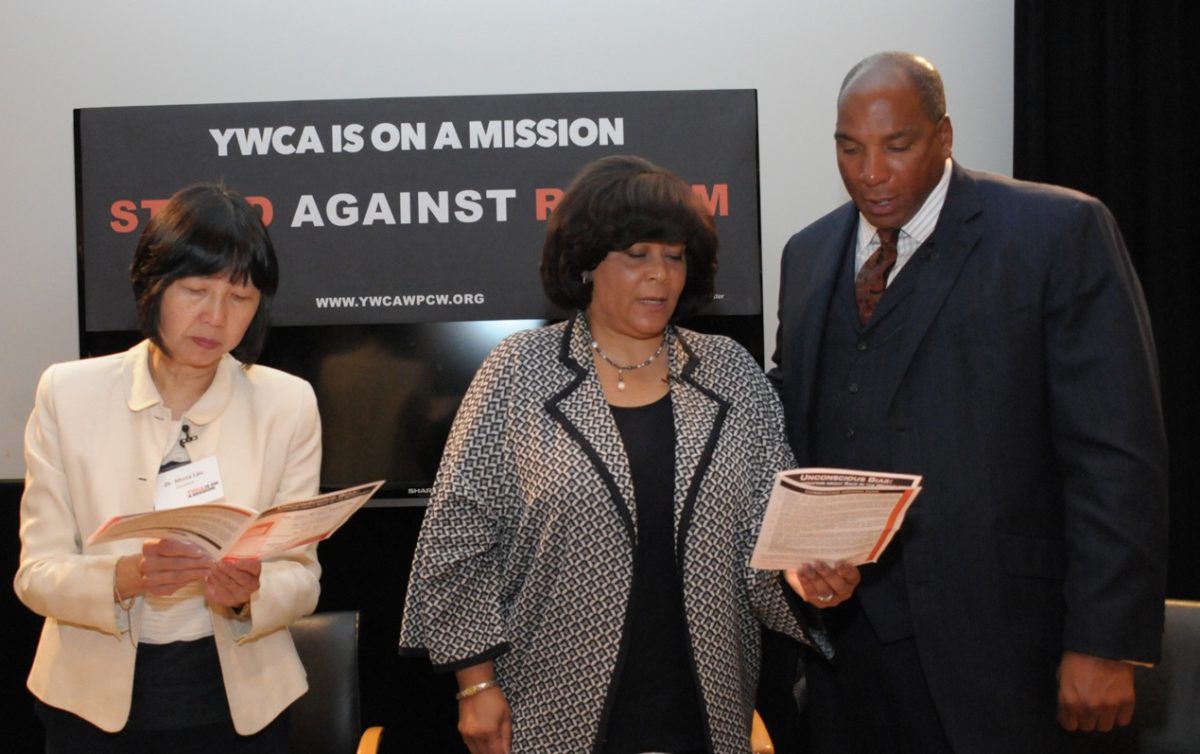Earl “Butch” Graves Jr. likes to ask simple questions like, “Does anything strike you as strange here?”
As president and CEO of Black Enterprise media in Manhattan, he has seen some strange things in corporate board rooms, high-level client meetings and country club gatherings.
What is plain to him is obscure to some people: There are not many black faces in the room and little curiosity about why that is.
His simple questions became a touchstone during a panel discussion on “Unconscious Bias: A Conversation About Race in the Workplace,” on April 28. The event was presented by the YWCA and Mastercard Inc.
Panelists discussed the enormous impact of unconscious bias in the workplace.
The idea of creating a diverse workplace was originally meant as a way to combat outrageous, obvious biases, said Dr. Mona Lau, a Harrison psychologist and adjunct professor at Manhattanville College who has led several diversity programs.
But discrimination is often expressed unconsciously. The biased person is unaware of the harmful conduct, while the recipient suffers.
“You can”™t see it but you can feel it,” she said. “You can”™t prove it but you know it”™s true.”
Everyone has biases, she said, based on education, religious beliefs, family practices and life experiences. Biases can be good, for example, in helping people screen out unimportant information.
But filters also create false impressions and snap judgments that hurt people. They can lead to micro-aggressions, small behaviors that in any instance do not amount to much but easily accumulate into harmful patterns.
Unconscious biases influence hiring decisions, job assignments, promotions, performance reviews, training opportunities, policies, marketing campaigns, customer service and the selection of leaders.
“You”™re killed by a thousand cuts, not one big stab,” said Donna Johnson, chief diversity officer for MasterCard.
You are not invited to an important meeting, not once, not twice, but five times. You have worked hard on a project but your name is not mentioned when people are singled out for praise.
When you share your concerns with your boss, the reaction is, “Are you kidding? Your name is not on a list?”
You know it happened but the people who can make a difference think it hasn”™t happened.
She said a diverse workplace, especially in leadership positions, can counteract unconscious biases.
Talking about hidden biases can help people recognize their blind spots, said Julia Nesbitt, the YWCA”™s director of racial justice initiatives, and use techniques to counteract them.
Graves ”“ a resident of Chappaqua, a graduate of Yale University and Harvard Business School, and a co-founder of a private equity firm ”“ discounted the idea of unconscious bias.
“Most African Americans find it hard to believe. From the time I wake up and leave home to when I return home, I”™m facing conscious bias.”
He said no corporation accepts blatant discrimination. But institutional patterns of discrimination still thrive. How is it possible, he asked, that there are no African American board members on 175 of the 250 largest corporations? And why do other boards have only one black male and one white female?
“It”™s almost like a quota system,” he said.
Graves called for a more assertive stance, whereby African Americans and women confront workplace biases candidly and straightforward.
He advocated a “Rooney Rule” for corporations. The National Football League rule, named for Pittsburgh Steelers owner Dan Rooney, requires teams to interview minority candidates for head coaching positions and senior operations jobs. Teams that fail to do so are fined.
Few black coaches had ever been hired, and once hired they were more likely to be fired than their white counterparts even when they had won more games. The rule did not require teams to hire minority candidates, but after it was established in 2003 the number of black and Hispanic coaches increased.
Linking results to compensation, Graves said, has a way of making things happen.
Remember that question he likes to ask?
He described a meeting for which a luxury auto manufacturer had hired an advertising agency to report on the African American market. In come four white males from the agency.
Graves whispers to the CEO, “Anything strike you as wrong?”
“What are four white males going to tell us about ourselves?” he asked.
The CEO adjourned the meeting and dismissed the consultants.
Things won”™t change, Graves said, until people in power are confronted directly and held accountable for their actions.
About 90 people attended the event at MasterCard”™s campus in Purchase.
YWCA White Plains & Central Westchester sponsored the program as part of its Stand Against Racism campaign.




















